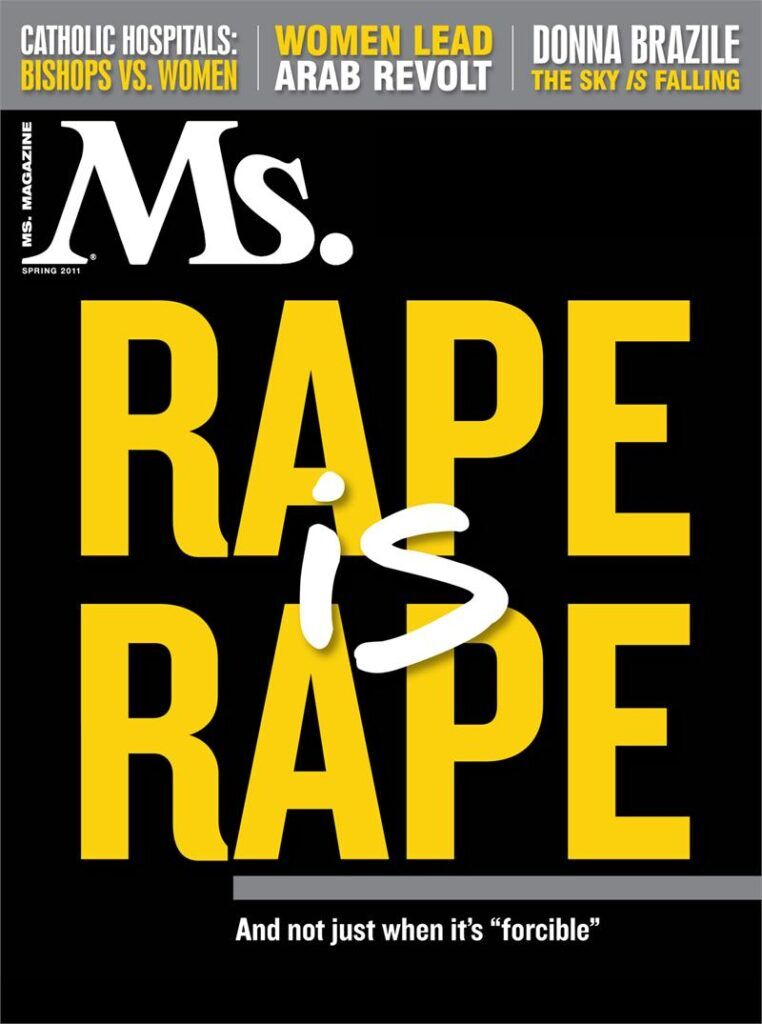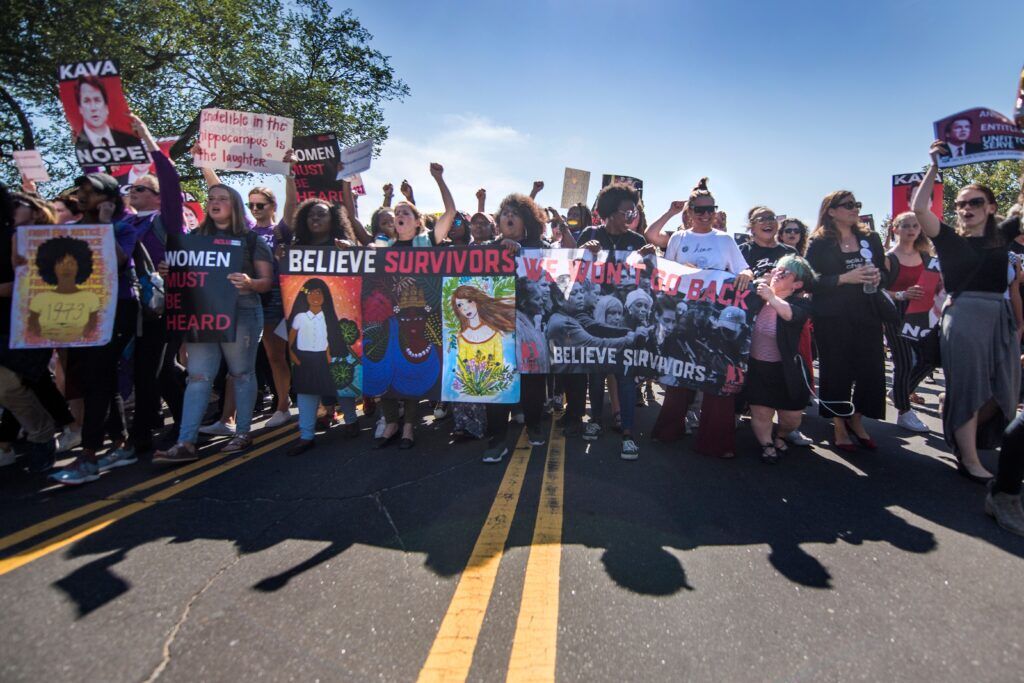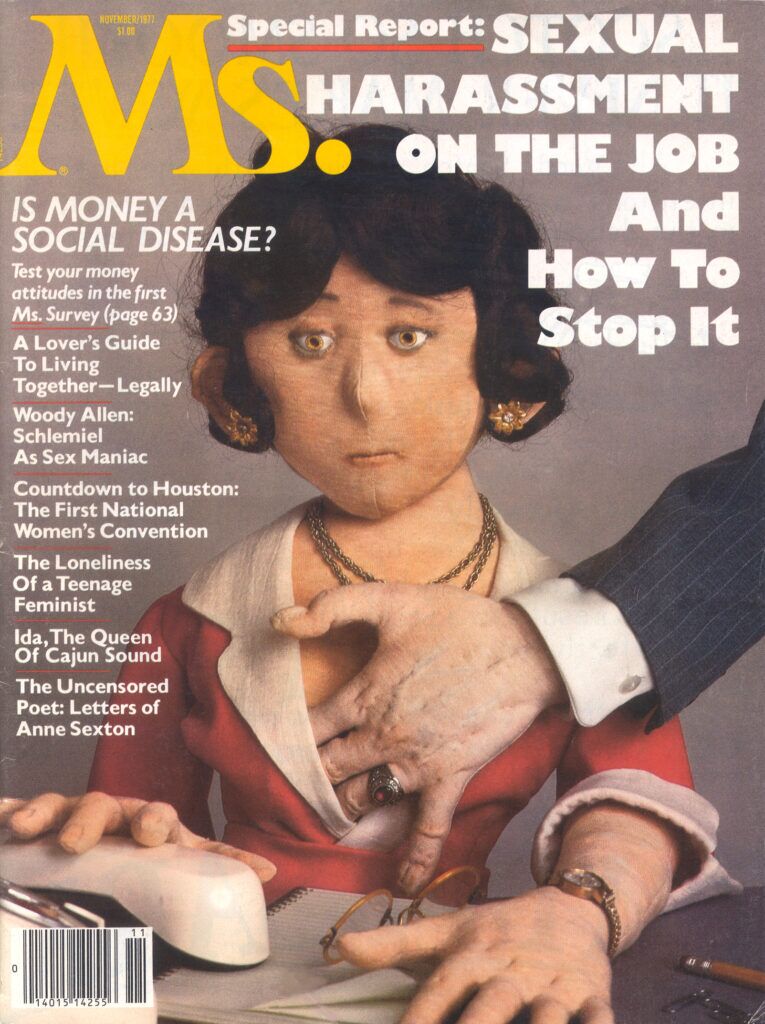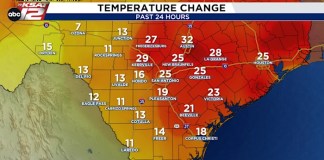In the fourth episode of Looking Back, Moving Forward, advocates and experts name the sociopolitical factors that fuel gender-based violence, and outline what it will take—in the courts, legislatures and our communities—to finally break the cycle.
”If you’re going to institute male supremacy, you have to have a system of control that relies on two things,” Jane Caputi explains in the latest episode of the Ms. Studios podcast Looking Back Moving Forward. “Both actual force and violence, to terrorize, intimidate, as well as to silence those you are subjecting to oppression; but you also have to condition everybody to accept it as normal.”
Caputi, professor of women, gender and sexuality studies at Florida Atlantic University and the author of The Age of Sex Crime, was the co-author, with Diana Russell, of a 1990 piece for Ms., published in the wake of the 1989 École Polytechnique massacre in Montreal, in which a shooter killed 14 female engineering students in an explicitly anti-feminist attack. Caputi and Russell, in their piece, used the then-recently coined term “femicide” to define the shooting, as well as other forms of gender-based violence—including domestic violence, sexual violence and institutional and cultural violence.
“The ubiquity of it shows how intent they are at maintaining a patriarchal system,” Caputi adds, “but then they flip it to say: ‘Actually, this shows just how natural this is. It’s just the order of things as they are.’”
The fourth episode of Looking Back, Moving Forward traces 50-plus years of feminist writing and advocacy focused on sexual harassment, rape culture and intimate partner violence—and the urgency of confronting the violence of patriarchy, white supremacy and other social forces in our everyday lives. I spoke with Caputi and other experts and advocates for the episode, and together we charted pathways to justice, survivor solidarity, and a feminist future without violence.
You can listen to the episode in full now on Spotify, Apple Podcasts, iHeart Radio or wherever you get your podcasts, or at msmagazine.com. And make sure you like, follow and subscribe so you don’t miss the next installment — then rate, review and share the podcast with your co-conspirators so they don’t, either!
Ms. was published before words like “sexual harassment” and “domestic violence” had even entered the lexicon. Naming the problem was a critical first step in changing the narrative around such violence, which had, for decades if not centuries, been normalized by powerful men and the laws they created.
“In 1982,” Ellen Sweet recalls, “Ms. published an article, and it was the first article identifying something that we call date rape. As far as I know, the term really had hardly ever been mentioned or used, and we had an enormous response to it from our readers, which led us to want to do a study of the phenomenon and say more about it.”
Sweet coordinated a nationwide study of campus date rape, or acquaintance rape, commissioned by Ms. in the 1980s—the first national study of its kind. The survey of more than 7,000 male and female students on 35 college and university campuses, directed by Mary P. Koss at Kent State and funded by the National Center for the Prevention and Control of Rape, found that 52 percent of women had experienced some form of sexual victimization, and 84 percent knew their attacker.
“Ninty percent didn’t think that their rape, that it was rape at the time, or that it was a crime,” Sweet explained. “The wisdom had been that rape was what happened with a stranger in a dark alley or some kind of home invasion, and people just didn’t believe it could happen between people who knew each other on a date or whatever, an acquaintance, someone they knew.”
More than one-third of the women who shared with Ms. that they had been raped did not discuss their experience with anyone.
People didn’t want to look at it. We ripped the Band-Aid off and said, ‘No, this is a public policy matter.’
Law professor Victoria Nourse
“Statistics alone will not solve the problem of date rape,” Sweet explained in a 1985 piece for Ms., “but they could help bring it out into the open.” Giving language to the reality of gender-based violence has also empowered survivors and advocates to speak out—and identify the root problems that lead to widespread violence and harassment.
“Language is so important,” Caputi adds. “It breaks through the denial as well as the lies that have been told. There are so many different so-called myths about rape, which is that this is just some kind of normal or natural occurrence. That these men, they’re psychopaths, we don’t know where they come from. Just a complete denial that, basically, masculinity associates men with violence.”

“We live in a culture that has always been highly patriarchal, highly white supremacist,” Vanessa Tyson affirms. “I don’t think anybody who has studied history and has looked at this would think otherwise.”
Tyson, chair of the department of politics and associate professor of politics at Scripps College, fought for survivors for years as an advocate and political staffer—and, in 2020, ran for the California State Assembly on an explicitly pro-survivor agenda. She sees gender-based violence as a political issue, fueled by disparate representation in positions of power as well as the legacies of misogyny, white supremacy, and capitalism in the U.S.
“I don’t have fond memories of the Reagan Era,” she explains. “I have memories of terms that were developed, like ‘crack whores.’ I remember Ronald Reagan talking about ‘welfare queens.’ This was all a means of trying to denigrate women who didn’t have money, who had never been offered stability. Particularly for women of color and Black women, this was a way to demonize us, to act as if this country wasn’t built upon our serving as chattel.”
“There has been a tendency amongst civil rights scholars to not centralize the Black women’s experience to subjugate it and never talk about the dynamic of raping Black women’s bodies, and the fact that we’ve never truly had control,” Tyson adds. “We have a society that allows particularly women, persons who have been victims of trauma, to fall through the cracks.”
Policies and the law are a critical way to confront such a complex and urgent political problem. They can also fuel the social change that is needed to truly break the cycles of violence that are embedded in our culture.
“When people came forward, and told their truth, it became undeniable that this is a societal crisis…that victims of harassment have not been taken seriously, that they have been discredited.
Attorney Debra Katz
“People didn’t want to know, because it’s a really intimate and hard issue—that the people you love are doing you damage,” Victoria Nourse, the Ralph V. Whitworth professor in law at Georgetown Law, explains. “That’s a very difficult thing to get your mind around. People didn’t want to look at it. We ripped the Band-Aid off and said, ‘No, this is a public policy matter.’”
Nourse played an integral role in crafting the original Violence Against Women Act—which, in 1994, became the first comprehensive federal law specifically addressing issues of gender-based violence and harassment. The impact of confronting gender-based violence with policy was evident in statistics taken nearly 20 years later: Between 1993 and 2022, rates of domestic violence dropped by 67 percent, and there was a 56 percent decline in rapes and sexual assaults.
Nourse insists that “the culture shift should not be diminished.”
“When we were working on this, there was one senator who said, ‘Oh, battered women’s shelters, they’re indoctrination centers for runaway wives,’” she recalls. “Ronald Reagan was disputing various things about whether battering existed. People didn’t even think it existed—and oftentimes, they blamed the victims.”
“There are difference of opinions about how to handle this, whether this really does affect women’s equality,” she adds. “There are differences of opinions about how and what kind of remedies women should have when they are injured and how it should play out on college campuses, how it should play out in various different locations in the country. But culturally, [VAWA] has solidified opinion about the importance of this issue for women.”

Much like policy change can fuel social change, shattering the silence around gender-based violence and harassment can change how policymakers and lawmakers respond to the epidemic of violence against women.
“We represented women who would come forward, and the companies would respond by saying, ‘You’re not telling the truth. You need to leave. The harasser stays.’ It just became the cost of doing business,” Debra Katz, founding partner at Katz Banks Kumin, remembers. “And then, everything shifted when the #MeToo movement happened.”
Katz’s career representing survivors and whistleblowers began when she was a legal fellow working on the case Meritor Savings Bank v. Vinson, which led to the Supreme Court’s historic decision, in 1986, that sexual harassment was a crime. Forty years later, Katz has been called “the feared attorney of the #MeToo movement” for her work representing clients including Christine Blasey Ford, who accused Supreme Court Justice Brett Kavanaugh of sexual assault during his confirmation hearings, and survivors who sued Harvey Weinstein for harassment and assault.
“When people came forward, and told their truth, it became undeniable that this is a societal crisis, [a] structural crisis in our system—that victims of harassment have not been taken seriously, that they have been discredited,” Katz says. “Now it was undeniable, because everybody was acknowledging that this was their experience. What they saw in the workplace, and sexual violence outside of the workplace, was endemic.”
“What does it mean that so many women, in particular, have to shoulder the burdens of violence and abuse in our day-to-day lives? What would a world look like where victims of violence aren’t simply here to survive, but are here to thrive?”
Political scientist Vanessa Tyson
More than 50 years after Ms. began to spark conversations around gender-based violence, one in five women in the U.S. has survived rape or an attempted rape, 81 percent of women have experienced some form of sexual harassment or assault, and nearly one in two women experience abuse from a partner in their lifetime. There’s also much at stake for survivors with the Trump administration in power, given the president’s penchant for defending and empowering men accused of sexual misconduct and gender-based violence and his dangerous disregard for critical funding and policies for prevention and survivor support.
But feminists, of course, must not be deterred. We must not stop speaking out, sharing our own stories, and calling for a different tomorrow.
“It’s just a constant battle to keep these stories in front of the public, and to continue to point out abuses where they occur,” Katz urges, “and to really know that we sink or swim together, that these issues are all connected. We have to work in coalition. We have to be relentless… We just have to be resolute and choose our battles carefully, and there will be wins.”
Katz looks to the Weinstein trial as an example of the complicated, but not impossible, fight ahead. When the disgraced film producer was recently retried, he was convicted on one count, acquitted on another, and in the third, the court declared a mistrial. “In the first trial, he was readily convicted on those counts. So, how do we look at that?” Katz asks. “His lawyers argued that Harvey Weinstein was the victim of the #MeToo movement, that his assaults of these women were what the women signed up for in trying to advance their careers… Well, a jury carefully deliberated. After a six-week trial, they looked at the evidence, and they still convicted him. He is still a convicted rapist, predator.”
In other words: “It’s more complicated, but we will still get wins.”
There is a serious backlash, but if we learn from women’s history, that’s when we have to keep pressing on. We have to keep showing that there is another way, and living that way.”
Jane Caputi, author of “The Age of Sex Crime”
“I expect that there will be cuts in funding for the Violence Against Women office,” Nourse says. “A lot of funding for these shelters comes from VOCA, the Victims of Crime Act. When the federal government prosecutes rich criminals, who have extorted millions of dollars from consumers, or revealed private information, the Justice Department gets a settlement—and they’re often billions of dollars—and a percentage of that goes into this Victims of Crime fund.” But, Nourse explains, “if you don’t prosecute billionaires and millionaires, then there’s less funding, and this happened during the last Trump administration. The VOCA fund went precipitously down.”
Yet even Nourse, facing down the legal landscape for survivors, believes “we will see slow progress on gender violence as we go forward.”

“It won’t be easy, particularly not in the current environment,” she adds. “We need to maybe take a pause about grand schemes, and recognize that change often comes from fixing nuts and bolts—and listening, of course, to survivors. It has to be an all of the above strategy. We need to have a big vision of equality at the top. We need to have people working on legal remedies, as well as taking care of survivors.”
“We’re in the middle of this terrible backlash,” Caputi adds, “because patriarchy does feel so threatened—and I do mean white supremacists, capitalists, heterosexual, patriarchy. It’s terrible, and it’s getting worse, but it’s because we have been so successful so far. We’ve gotten laws against rape in marriage, against sexual harassment… There really has been so much opened up in terms of a transformation, not only of consciousness, but of society. There is a serious backlash, but if we learn from women’s history, that’s when we have to keep pressing on. We have to keep showing that there is another way, and living that way.”
“I was a little obsessed when I was a kid with this concept of fairness,” Tyson explains, “because fairness on whose terms? When and where do we get to this place called fair? Because it sounds like a lovely utopia, but so far I haven’t really seen it.”
“How are individual citizens expected to survive in a society that is grossly unfair, grossly unequal?” Tyson asks. “What does it mean that so many women, in particular, have to shoulder the burdens of violence and abuse in our day-to-day lives? What would a world look like where victims of violence aren’t simply here to survive, but are here to thrive?”
These are the questions that continue to motivate the activists and advocates leading the fight to end violence, smash patriarchy and protect survivors—and our work won’t end until we know what it looks like when we are all safe, when we can all thrive, and when the world we live in recognizes violence as part of the larger systems we have the dismantle in order to build a truly equitable future.
Great Job Carmen Rios & the Team @ Ms. Magazine Source link for sharing this story.



